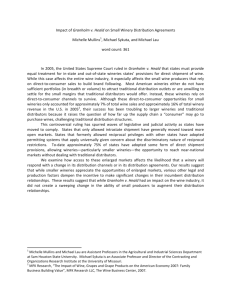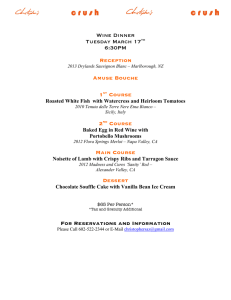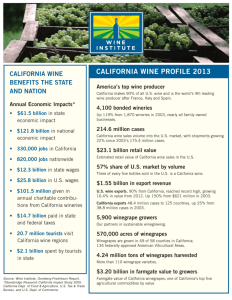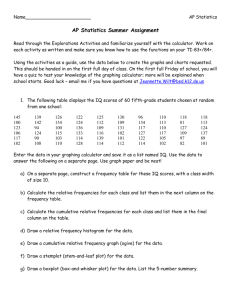Growing Winegrapes Across America
advertisement
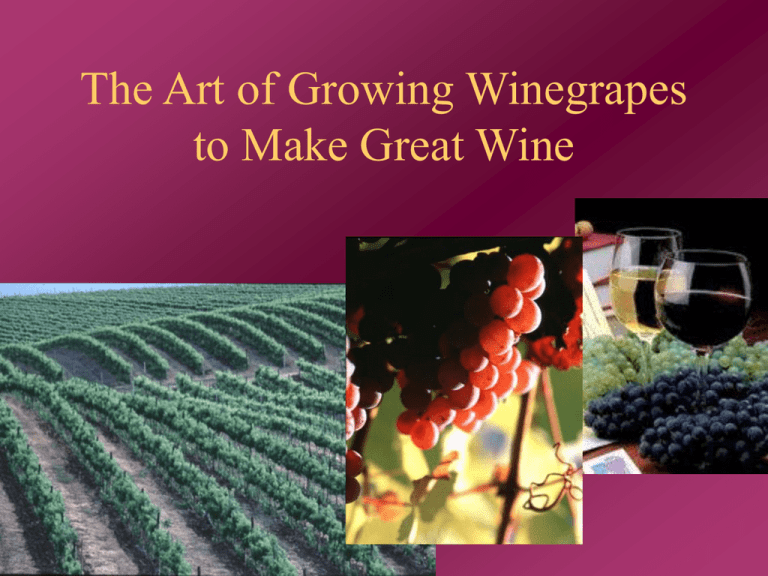
The Art of Growing Winegrapes to Make Great Wine Growing Winegrapes Art Science Way of Life Jobs Tax Revenues Exports Tourism Economics GREAT WINE! Production in Over 40 States Grape Crop Value Billions 3.5 3.0 2.5 2.0 1.5 1.0 0.5 Year 19 93 19 95 19 97 19 99 19 85 19 87 19 89 19 91 19 77 19 79 19 81 19 83 19 69 19 71 19 73 19 75 0.0 Rural Renaissance • More than 2,000 wineries in America • A winery in every state • Central part of the Rural Renaissance Great Wine Begins with Top-Quality Grapes Long-Term Investment: • $1 million investment to get started • 3 years before vines produce viable crop • Even longer to produce positive cash flow. Climate and Geography • • • • • • • Soil type Average rainfall Temperature Humidity Sunshine Winds Other Climatic Factors Soil Sample Tuscan Stony Loam: • Well-drained • Pebbles & cobbles • Low fertility • Scarce water …Makes for good grapes! Choices: Site and Varietals • Site determines quality • Choosing the wrong site can be a costly mistake. • Anticipating market demand is key. Growing Practices: Spring • • • • Frost protection Vine, bud protection Cover crops Mowing and chemical weed control Summer • • • • • Canopy Management Moisture control Pest management Sulfur application Irrigation Fall • • • • Harvest Timing is key Birds love grapes, too! Busy time for growers and wineries. Winter • • • • • Cover crops Controlled burns Pruning Weed control Grapes are dormant Growing with Care Dealing with the elements • Water supply • Weeds • Protecting wildlife habitat • Insect invasion Integrated Pest Management • • • • • Ecology and dynamics of the crop Ecology and dynamics of the pests Assessing levels of pests & natural enemies Establishing economic thresholds Use most appropriate controls – – – – – chemical cultural biological behavioral genetic Water Conservation • Drip irrigation • Accurate fertilizer application • Vineyards use less water than other farms and housing developments Soil Quality • • • • Add organic matter Build soil structure Micro-organisms Improve water penetration • Minimize erosion and water run-off Owl Boxes and Raptor Perches Growing Responsibly • • • • Reducing herbicide use Using advanced technology Sound labor practices Reduced-risk pesticides Million Gallons U.S. Spain Italy 1600 1400 1200 1000 800 600 400 200 0 France World Wine Production • U.S. is fourth largest wine producer in the world. • Argentina, Germany, Australia and South Africa follow. • U.S. share: 7.2% World Wine Consumption • The United States ranks third in world wine consumption. • But per capita consumption is a lowly 34th! U.S. Wine Exports 600 500 400 300 200 $ Million 2000 1999 1998 1997 0 1996 100 1995 • Exports have climbed 16-fold from $35 million in 1986 to $560 million today. • California accounts for more than 90% of the nation’s wine exports. U.S. Wine Export Markets UK 26% Canada 19% Netherlands 14% Other 26% Japan 12% Germany 3% California • 90% of US wine production • 565,000 acres in 45 counties • 847 commercial wineries family owned • Economic Impact: $33 billion • Fourth largest wine producer in the world Michigan • Wine grape acreageapproximately 1500 acres (2000 data) • 24% increase since 1997 • Michigan wineries produce more than 200,000 cases of wine annually • Approximately two million liters • High proportion from Michigan Grown Grapes • Michigan has 30 wineries (up from 17 in 1995) • Open to the public for tours and tasting • There are an additional 14 tasting rooms affiliated with the wineries around the state • Recent MSU study determined economic impact in 2000 was $75 million • $16.6 million attributed to tourist spending on non-winery products and services in those communities New York • 121 wineries, 100 are new since 1985 • 2.7 million winery visitors last year • 31,400 acres of grapes 13,000 in winegrapes • 40.8 million gallons of wine annually Washington • • • • • Rapid Growth 30,000 acres of winegrapes 170 wineries $2.4 million economic impact “Wine Region of the Year” Oregon • • • • More than 180 wineries 11,000 winegrape acres Threefold growth since 1990 $120 million in wine sales Texas • • • • 1.6 million gallons produced in 1997 40 wineries and growing 2 million gallon potential Annual economic impact: $100 million Pennsylvania • 68 family-owned wineries • 14,000 acres of winegrapes • Mild winter climates Ohio • Long history of winemaking • 60 new wineries since 1965 • State encourages growth in quality and quantity North Carolina • • • • • 550,000 gallons annually 850 bearing acres Farmgate value: $2.66 million Muscadines date back to Colonial days $25 million wine sales from 22 wineries Maryland • 76 vineyards • 200 growers • 90,000 gallons Missouri • • • • 37 registered wineries $26 million in wine sales 256 jobs 450,000 gallons Virginia • • • • 200 commercial growers 71 licensed wineries 2,100 bearing acres 500,000 visitors Adding Value Rural Renaissance Adding Value Rural Renaissance Adding Value Rural Renaissance Adding Value Rural Renaissance Adding Value Rural Renaissance Appellation • Denotes all-important geography and microclimate • Informs the consumer • Encourages quality standards • Indicates unique climate, soil, topography and history Great Wine Comes from Top-Quality Grapes Acknowledgments Project Director: Karen Ross, President California Association of Winegrape Growers Author and Art Director: Anne Chadwick The Chadwick Company Facts and Photography: American Vintners Association Fetzer Vineyards Lodi-Woodbridge Winegrape Commission North Carolina Department of Agriculture Ohio Wine Producers Association Oregon Wine Advisory Board Pennsylvania Wine Association Sonoma Valley Vintners and Growers Alliance Sonoma County Grape Growers Association Texas Department of Agriculture University of California Washington Wine Commission Winegrape Growers of America Wine Institute WineVision
